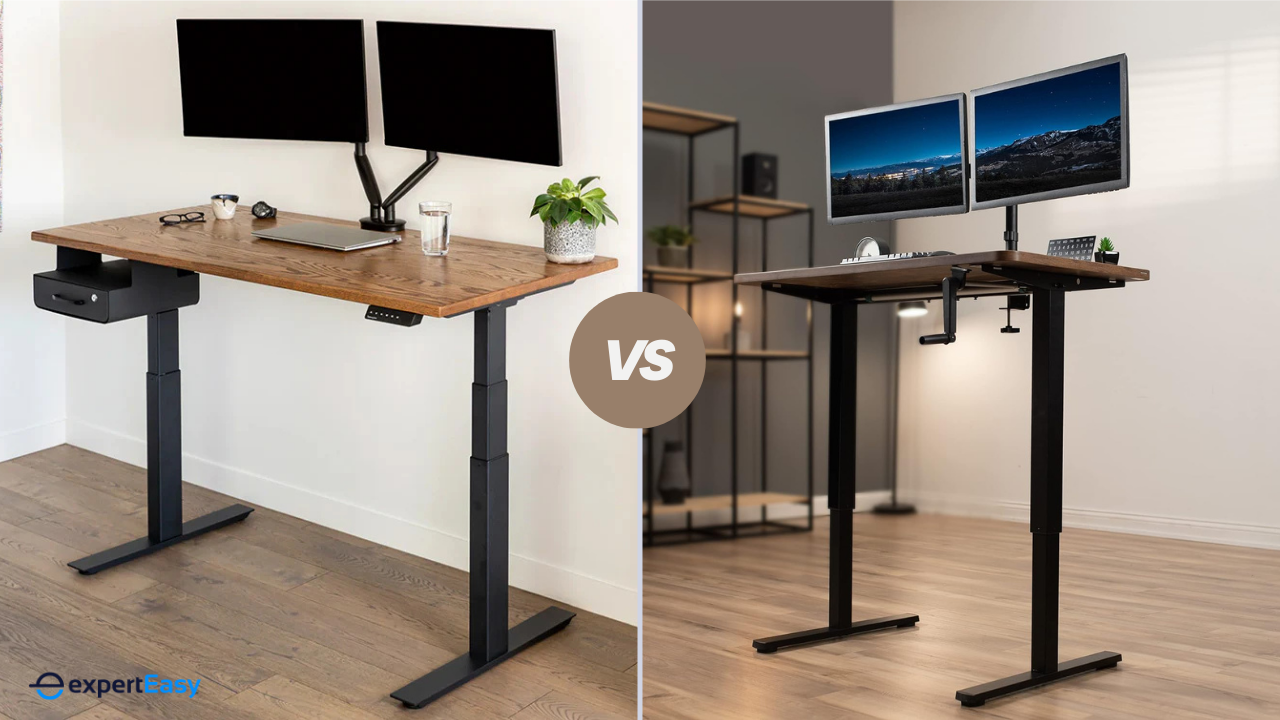Choosing between an electric and a manual standing desk has significant implications. As more people recognise the health benefits of standing desks, deciding which type to invest in is more crucial.
Both have unique value propositions, but you must choose which suits your work habits. In this blog, I’ll explain the key differences, pros, and cons of both desk types to help you decide.
Let’s get started.
What is an Electric Desk?

An electric desk is a sit-stand desk easily adjusted in height using an electric motor. With just the push of a button, you can raise or lower the desk to switch between sitting and standing positions. This makes finding a comfortable working height convenient without manual effort.
Electric desks can be classified into two distinct categories: the number of motors and the desk shape. Desks with a single motor are generally more affordable but have a lower weight capacity and slower adjustment speed than dual-motor desks, which are more expensive but offer better stability.
For shape, you'll find L-shaped desks and the more common rectangular shape. L-shaped desks are ideal for corner setups and anyone needing extra surface area for multiple monitors and equipment.
Pros of Electric Desks
Electric standing desks offer many benefits to enhance your workspace and overall well-being. Here are some of the key advantages:
- You can easily adjust the desk height.
- Electric desks allow for precise adjustments.
- Ease of use maintains energy levels and improves focus.
- More programmable settings.
- Electric desks operate quietly.
Cons of Electric Desks
While electric standing desks offer numerous benefits, they also have drawbacks. Here's what to look out for:
- Electric standing desks are more expensive.
- Electronic components and motors are prone to malfunction.
- Electric desks are often difficult to move.
- Electric desks require a power source.
- Production and disposal of electronic components have significant environmental impact.
What is a Manual Desk?

A manual standing desk is adjustable in height using a hand crank or lever. Unlike electric desks, manual desks require you to manually turn a crank or pull a lever to raise or lower the desk, which takes more effort and time.
The major con of manual sit-stand desks is their inconvenience when adjusting. However, you can get by slightly by using pneumatic sit-stand desks. These desks use gas cylinders to help raise and lower the desk height, making the adjustment easier than cranks or levers.
Pros of Manual Desks
Manual standing desks have several advantages. Here are some of the key pros:
- Manual standing desks are less expensive.
- Manual desks can be used anywhere.
- Manual desks typically require less maintenance.
- Manual desks have a smaller environmental footprint.
- Manual desks' simpler mechanical design makes them more robust and durable.
Cons of Manual Desks
Here are some of the potential cons to consider for manual standing desks:
- Manual adjustment process is less convenient.
- Manual adjustments do not offer the same level of precision.
- Changing the height of a manual desk takes longer.
- Manual desks often have a lower weight capacity.
Manual vs. Electric Desks: Summary
Here's a summary table comparing manual and electric desks:
| Manual Desks | Electric Desks |
|---|---|
| Hand crank or pneumatic adjustment | Motorised adjustment |
| Requires physical effort to adjust | Simple button press for adjustment |
| Slower adjustment | Faster adjustment |
| Less precise | Highly precise height settings |
| Typically lower cost | Generally higher cost |
| Low maintenance, fewer parts | Require motor maintenance |
| High durability, fewer parts to break | Depends on motor quality and usage |
| No electricity needed | Requires electricity |
| Typically, lower weight capacity | Higher weight capacity |
| Often more portable | Heavier due to motor components |
| Simple design | Sleeker, modern designs available |
| Basic height adjustment | Memory settings, programmable heights |
How to Choose a Standing Desk?
To choose the best standing desk, here are other vital aspects to evaluate:
- Health: An electric desk is better if you have special needs or health issues like a bad back.
- Budget: Manual standing desks are usually cheaper than electric ones, so they are better if you're trying to save money.
- Frequency of use: Consider how often you switch between sitting and standing. If you do it frequently, an electric desk is more convenient.
- Power: Does your workspace have enough power outlets? If not, or if the power is unreliable, a manual desk is ideal.

Final Verdict
Electric standing desks offer effortless adjustment, allowing for quick and precise height changes. However, they are more expensive and require a power source, which might not suit your budget or office setups.
In contrast, manual standing desks are a more cost-effective and eco-friendly solution. While adjusting requires physical effort, they are user-friendly and stable. They are ideal if you prefer a straightforward, durable, and reliable sit-stand desk with no electrical components.
You see, the final decision boils down to your budget, ease of use, and the importance of adjustment speed. Do not look past these and choose based on your colleagues' or friends' experiences, as what is the best fit for your work habits and environment may differ from theirs.








